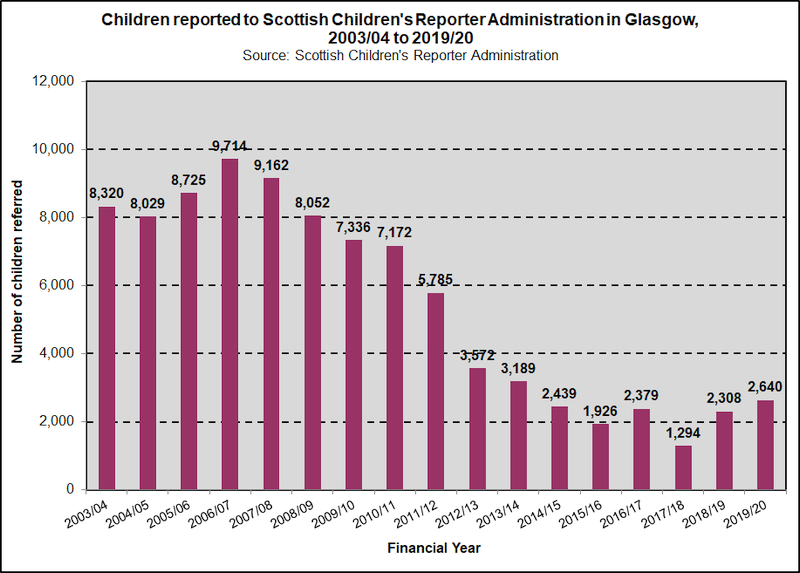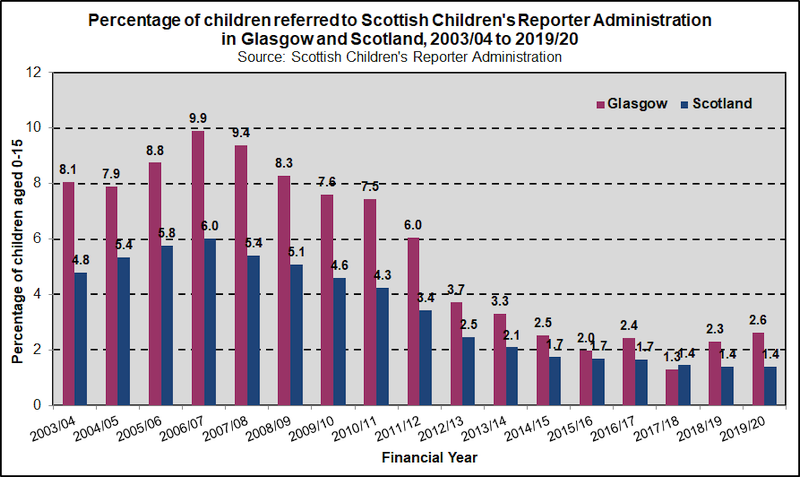Glasgow
Children reported to the Scottish Children's Reporter Administration in Glasgow

2,640 children and young people were referred to the Scottish Children's Reporter Administration (SCRA) in 2019/20, because some aspect of their life was giving cause for concern. This number was the highest since 2013/14.
In 2019/20, 85% of Glasgow referrals to SCRA were made by the police, with 6% made by social work and 4% by education. In Scotland as a whole, 75% of referrals were made by the police in 2019/20, 15% by social work and 5% by education.
The most common reasons for referral in 2019/20 in Glasgow were 'close connection with a person who has carried out domestic abuse' and 'lack of parental care'.
Children referred to the Scottish Children's Reporter Administration in Glasgow and Scotland
The Glasgow and national percentages of children referred to the Scottish Children's Reporter Administration (SCRA) follow a similar pattern over the time period from 2003/04 to 2019/20. The percentage of children referred gradually increased until 2006/07, after which it decreased and has remained relatively stable since 2014/15. Except for 2017/18, Glasgow had a consistently higher percentage of referrals to SCRA than Scotland as a whole.
Children reported to the Scottish Children's Reporter Administration by gender
 Following a peak in 2006/07, the numbers of boys and girls being referred to the Scottish Children's Report Administration (SCRA) in Glasgow have generally decreased, reaching their lowest level in 2017/18. In the last two years, children's referrals to the SCRA in Glasgow has risen for boys and girls.
Following a peak in 2006/07, the numbers of boys and girls being referred to the Scottish Children's Report Administration (SCRA) in Glasgow have generally decreased, reaching their lowest level in 2017/18. In the last two years, children's referrals to the SCRA in Glasgow has risen for boys and girls.
The gap in referrals between boys and girls has also slightly narrowed, with boys accounting for 60% of referrals in 2003/04 and 56% in 2019/20.
Children referred to the Scottish Children's Reporter Administration by type of referral
 Following a peak in 2006/07, the number of referrals (offence and non-offence) decreased until 2014/15 and has been relatively similar since (with the exception of 2017/18). The number of children referred on offence grounds has decreased by 86% since 2003/04 while the number referred on non-offence grounds has reduced by 61% over the same period.
Following a peak in 2006/07, the number of referrals (offence and non-offence) decreased until 2014/15 and has been relatively similar since (with the exception of 2017/18). The number of children referred on offence grounds has decreased by 86% since 2003/04 while the number referred on non-offence grounds has reduced by 61% over the same period.
Notes
Children Referred to the Scottish Children’s Reporters Administration (SCRA) - This indicator provides information on children and young people referred to SCRA, who are aged 0-15 years or aged 16 or 17 years and subject to supervision requirements/remitted by a court.
All data for this indicator was obtained from the SCRA Online Statistical Dashboard. Data is presented within this section both in terms of numbers of children referred to SCRA and numbers of referrals of children to SCRA. Rates per 1,000 of the child population (aged 0-15 years) are available directly from the Online Statistical Dashboard.
The Children’s Hearings System is the care and justice system for Scotland’s children and young people. At the heart of the system are Children’s Reporters, who are based in local communities. Children and young people are referred to the Reporter from a number of sources, including police, social work, education and health. They are referred because some aspect of their life is giving cause for concern.
Referrals are split into two broad categories – care and protection, where the welfare of the child is causing concern, and offence, where the child is believed to have committed an offence. The majority of children are referred on care and protection grounds. More information on this can be found on the SCRA website.
Schedule 1 offences are against children and young people including sexual assault and abuse or infliction of bodily injury. For more details see Criminal Procedure (Scotland) Act 1995.
The gender of a small number of children referred to Scottish Children's Reporters Administration (SCRA) is not recorded.
Some children are referred on both offence and non-offence grounds within the same year. The total number of children referred (shown in other graphs in this section) will therefore be less than the sum of children referred on offence and non-offence grounds.

